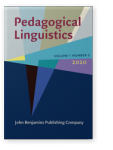Vol. 1:2 (2020) ► pp.95–124
From pedagogical input to learner output
Conditionals in EFL and CLIL teaching materials and learner language
English as a Foreign Language (EFL) materials have often been criticized for a lack of authenticity. However, their direct impact on learner language has rarely been assessed. We compare pedagogical input from EFL and Content and Language Integrated Learning (CLIL) materials to texts produced by learners taught via the textbooks in question. The analysis of corpus data showed that EFL textbooks did not systematically differ from CLIL materials in terms of conditional frequency and verb forms combinations. No significant difference was detected for CLIL and non-CLIL learner texts either. Both groups did, however, deviate from novice native writing in that conditionals expressing low hypotheticality were overrepresented while conditionals expressing a higher level of hypotheticality were underrepresented and frequently erroneous. Misrepresentations revealed for EFL textbooks in previous research were found to match the deviations in learner language in a way that aids L2 development rather than impairing it. Hence, fundamental changes are not required, even though more studies should be undertaken to investigate the direct impact of teaching materials on learner output.
Article outline
- 1.Introduction
- 2.Conditional sentences
- 2.1Classification of conditional sentences
- 2.2Corpus studies of conditionals in L1 text
- 2.3Studies of conditionals in teaching materials
- 2.4Corpus studies of conditionals in learner language
- 3.Method
- 3.1Corpora and EFL materials
- 3.2Query and annotation procedures
- 3.3Statistical analysis
- 4.Conditionals in teaching materials
- 4.1EFL materials: Typology represented in grammar sections
- 4.2EFL and CLIL materials: Corpus analysis
- 5.Conditionals in learner writing
- 6.Discussion and conclusion
- Notes
-
References
